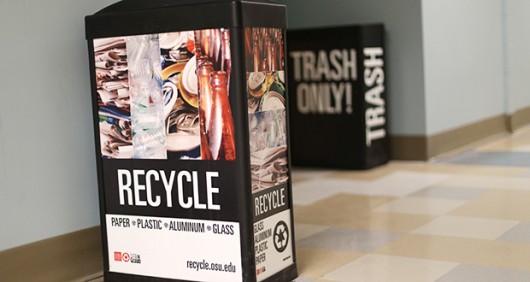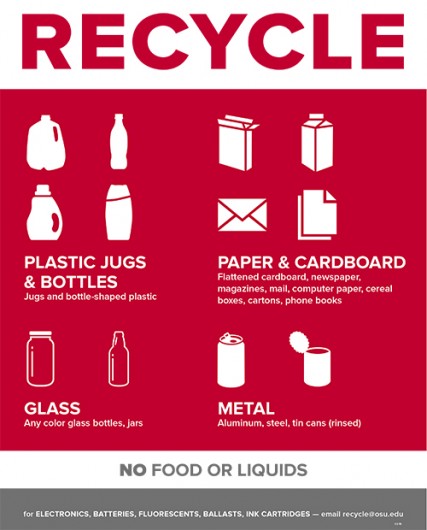Earth Day is April 22, but Ohio State is planning on making changes to on-campus recycling that will encourage environmentally friendly living every month.
Recyclingbins will be getting new paneling, said Tony Gillund, sustainability coordinator for OSU’s Energy Services and Sustainability. He added that the panels will be plastered on every recycling bin on campus so that students will see the same message where they live, work, study and play.
“The new informational stickers and recycling bin panels have been designed to create a uniform appearance and provide clear messaging about what items are recyclable,” Gillund said in an email. “With a clear message and a uniform appearance, the new panels will lessen some of the confusion of what can be recycled.”
Energy Services and Sustainability received $26,000 from the University Sustainability Fund, along with an additional $10,000 from Facilities Operations and Development, to purchase new panels along with recycling stickers for informational desks around campus, Gillund said. A coalition of student organizations related to sustainability from the Student Sustainability Council will replace the panels in mid-April, Gillund said.
The panels will be replaced as a part of a university recycling education campaign. The campaign will also use emails, newsletters, social media and video monitors throughout campus to educate students and faculty about proper recycling techniques, Gillund said.
Gillund added that the panels will help educate the campus by bringing consistency. The side-by-side recycling bins that are currently positioned throughout campus do not have uniform panels, which can confuse people on what is and isn’t recyclable, he said.

Recycling bins will be getting new paneling as a part of changes to on-campus recycling that will encourage environmentally friendly living every month. Credit: Mark Batke / Photo editor
Some students said they can get confused, and think the panels will greatly help explain the process of recycling.
“The panels are a great idea,” said Evan Hanawalt, a third-year computer science and engineering. “A huge problem I have with recycling is just not knowing what I’m doing.”
Hanawalt said he can never tell what can and can’t be recycled and usually doesn’t have the time to figure it out.
“If I have to run to class or to study and there’s only one bin, I might not really look. It’s not that I don’t want to recycle, it’s just not convenient,” he said. “I actually was pretty interested last week and looked up what is recyclable and what’s not, but it’s still confusing.”
Hanawalt said he thinks it’s important for students to learn more about recycling, and the panels are a step in the right direction.
Christian Watson, a third-year in music education, said he also doesn’t think that the current recycling bins are particularly effective and that most students will indiscriminately throw anything in either the recycling or trash bins.
“Updated, more specific labels would lead to a more environmentally conscious campus,” he said.
Other students speculate that the reason for the confusion stems from the similar look of the trash bins and recycling bins.
“It seems like there’s a reasonable number of recycling bins, but they look exactly like the trash bins and people don’t pay attention to them,” said Frank McGough, a Ph.D. candidate in the history department.
McGough said he thinks the new labels will clarify some of the confusion.
“Anything that’s going to get students to be a little more conscious about recycling, I’d say that is a good thing,” he said. “That sounds wonderful to me. I would love to see something like that.”
Michael Huson contributed to this article.
Correction:
April 1, 2015
An earlier version of this article incorrectly stated that both recycling and trash bins are set to get new labels in April. In fact, only the recycling bins will receive the new labels.



